#101 NSAIDs and cardiovascular safety: the truth makes my heart hurt

Reading Tools for Practice Article can earn you MainPro+ Credits
Join NowAlready a CFPCLearn Member? Log in
- Mixed population, primarily arthritis, at low-moderate CV risk (i.e. CV event rate ~1% per year).
- COX-2 inhibitors, compared to placebo, increased:
- All-cause mortality, Rate Ratio (RR) 1.22 (95% Confidence Interval 1.04–1.44).
- Major CV events, RR 1.37 (1.14–1.66).
- Diclofenac (150 mg/day): similar risks to COX-2s for mortality [RR 1.02 (0.84–1.24)] and CV events [RR 0.97 (0.84–1.12)].
- Indirectly, diclofenac significantly increases CV events [RR 1.41 (1.12–1.78)] but not mortality [RR 1.20 (0.94–1.54)] compared to placebo.
- Naproxen (1000 mg/day) has less CV events and mortality than COX-2 inhibitors and may be similar to placebo.
- Relative risk similar between patients with or without prior CV disease.
- 7,297 patients with arthritis with no prior CV disease followed for three years:2 3.4% in both groups
- 24,081 patients with arthritis with low-moderate CV risk followed for 2.8 years:3 Celecoxib 2.3% ibuprofen 2.7%, naproxen 2.5%.
- However, several limitations challenge "non-inferiority" of celecoxib: Wide non-inferiority margin (up to 40% higher CV risk),2,3 different conclusions based on analysis used,2 enrolled a lower-risk population than planned,2,3 comparison of non-equipotent doses with lower efficacy with celecoxib,2,3 high discontinuation and loss-to-follow-up,3 and others.4
- All COX-2s and NSAIDs, except naproxen and low-dose ibuprofen (≤1200 mg/day), increase CV risk.
- Risk increases with increasing NSAID dose.
- In Canada, naproxen (28%), celecoxib (21%), and diclofenac (17%) account for the majority of NSAIDs prescribed.6
- The magnitude of the CV risk with high-risk NSAIDs is similar to the magnitude of the CV benefit with statin therapy. Choosing high-risk NSAIDs (taken daily) can cause one additional CV event over five years in:1
- ~100 low-risk patients (baseline 5% ten-year CV risk).
- ~25 high-risk patients (baseline 20% ten-year CV risk).
- Generally, NSAIDs with relatively lower CV risks (naproxen) have relatively higher GI complication risks (ulcers and bleeds) and vice versa (coxibs).7
- Adding a proton pump inhibitor to a non-selective NSAID results in similar GI complication risks as COX-2s.8
- All NSAIDs increase risk of heart failure.1






